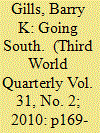| Srl | Item |
| 1 |
ID:
095053


|
|
|
|
|
| Publication |
2010.
|
| Summary/Abstract |
This article argues that the current protracted and severe financial and economic crisis is only one aspect of a larger multidimensional set of simultaneous and interacting crises on a global scale. The article constructs an overarching framework of analysis of this unique conjecture of global crises. The three principal crisis aspects are: an economic crisis of (over) accumulation of capital; a world systemic crisis (which includes a global centre-shift in the locus of production, growth and capital accumulation), and a hegemonic transition (which implies long term changes in global governance structures and institutions); and a worldwide civilisational crisis, situated in the sociohistorical structure itself, encompassing a comprehensive environmental crisis and the consequences of a lack of correspondence and coherence in the material and ideational structures of world order. In these ways, the global system is now 'going south'. All three main aspects of the global crisis provoke and require commensurate radical social and political responses and self-protective measures, not only to restore systemic stability but to transform the world system.
|
|
|
|
|
|
|
|
|
|
|
|
|
|
|
|
| 2 |
ID:
191676


|
|
|
|
|
| Summary/Abstract |
The conflict between Russia and the Euro-Atlantic Community has taken the form of a systemic crisis, in which we face the risk of running from incident to incident. It is argued that the European post-Cold War order has undergone a norm-transforming, rather than norm-governed change. The normative framework and shared purpose on which it rests and which are essential to stabilise and perpetuate an international order have been eroded. The crisis is assessed on the basis of both the acts of violation and retreat by key ordering agents and their intersubjective assessment of the order. It is argued that normative pillars have gradually dissolved in four key areas: the principles of the Paris Charter on the indivisibility of security, the arms control regime, collective security and the European border regime. Tackling these issues is particularly complicated, because some, such as arms control, require today a global approach, involving China.
|
|
|
|
|
|
|
|
|
|
|
|
|
|
|
|